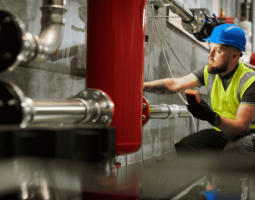As a retailer of Gardner Denver products, Cullum & Brown understands the importance of providing customers with informed choices when it comes to selecting air compressors. The array of options available can be overwhelming, but with this guide, we’ll delve into the various technologies, features, and considerations to help you navigate the selection process effectively.
Understanding Lubricated vs. Oil-Free Compressors
Lubricated and oil-free compressors cater to different industries and applications, each offering unique advantages and considerations. Choosing between lubricated and oil-free depends on factors like air quality, initial cost, long-term efficiency, and maintenance requirements.
Lubricated compressors use oil for lubrication, providing smoother operation and longer service life, but may introduce oil contamination in the compressed air. Oil-free compressors eliminate the risk of oil contamination, making them essential for industries where air quality is critical. Lubricated compressors offer smoother operation and longer service life.
Reciprocating Compressors
Reciprocating compressors, also known as piston compressors, are versatile and widely used in both consumer and commercial/light industrial segments. They operate by using pistons driven by a crankshaft to deliver compressed air. These compressors are suitable for low to medium-pressure applications (80 to 250 PSIG) and are typically a smart investment for small businesses looking for 30 HP and below.
In the commercial and light industrial sectors, reciprocating compressors have higher-end and lower-end offerings. Higher-end typically operate below 1000 RPM and are well-known for their durable and reliable cast iron design. Lower-end offerings, often seen as a price buy, feature a reduced cost through alternative materials and foreign manufacturing.
Gardner Denver lubricated reciprocating compressors specifically are ideal for low-pressure applications where a constant supply of compressed air is required, such as in workshops, automotive repair shops, and small manufacturing facilities. Oil-free reciprocating compressors are commonly used in industries where air quality is critical, such as in pharmaceutical manufacturing and food processing.
Purchasing considerations:
- Consumer vs. commercial/light industrial
- Lower-end vs. higher-end offerings
Rotary Screw Compressors
Rotary screw compressors are widely used in industrial plant air applications, known for their reliability, efficiency, and consistent performance. These Gardner Denver compressors, operating from 20 to 500 HP and from 80 to 175 PSIG, use two interlocking helical rotors to compress air, making them suitable for continuous operation in demanding environments.
Lubricated rotary screw compressors are ideal for general industrial applications, providing a reliable source of compressed air for manufacturing processes, pneumatic tools, and automation systems. Oil-free rotary screw compressors are essential for industries where oil contamination is unacceptable, such as in electronics manufacturing, medical facilities, and cleanroom environments.
Purchasing considerations:
- Size of airend for a given HP
- Fixed vs variable speed
- Enclosed vs unenclosed
- Single vs two-stage compression
- Packaged integral dryers
Rotary Vane Compressors
While less common, rotary vane compressors offer benefits such as durability, quiet operation, and suitability for harsh environments. These compressors use vanes mounted on a rotor to compress air, making them quieter and more energy-efficient compared to other types of compressors. Gardner Denver’s rotary vane compressors are typically found in lower HP ranges, making them ideal for small workshops, laboratories, and dental clinics. They offer a reliable source of compressed air with minimal maintenance requirements, making them a cost-effective choice for businesses looking to streamline their operations.
Purchasing considerations:
- Compact and efficient solutions for various applications
- Quieter and more energy-efficient operation
- Well-suited for applications in lower HP ranges (5 to 40 HP)
- Robust construction for harsh environments
- Built for durability and longevity
- Minimal maintenance requirements for cost-effective operations
Centrifugal Compressors
Centrifugal compressors are high-speed, dynamic compressors used in large-scale industrial applications where high volumes of compressed air are required. These compressors use centrifugal force to accelerate and compress air, making them suitable for applications such as power generation, petrochemical processing, and large-scale manufacturing.
Gardner Denver offers both standard-speed and high-speed centrifugal compressors, each designed to meet specific performance requirements. Standard-speed centrifugal compressors provide reliable performance and efficiency for a wide range of industrial applications. In contrast, high-speed centrifugal compressors offer superior performance, lower noise levels, and a smaller footprint, making them ideal for space-constrained installations and environments where noise is a concern.
Purchasing considerations:
- Full load efficiency
- Noise level
- Footprint
- Maintenance requirements
- Application expertise
The Bottom Line
Navigating Gardner Denver’s compressor selection requires understanding the tiered product offerings and matching them with specific application requirements. Cullum & Brown is committed to assisting customers in making informed decisions by providing comprehensive information and guidance. By considering factors such as technology, features, and performance, customers can choose the right compressor that optimizes efficiency, productivity, and profitability for their operations. With Cullum & Brown’s support, customers can confidently invest in Gardner Denver compressors that meet their needs and exceed their expectations.
Contact us today and let us become your trusted partner selecting the right Gardner Denver compressor for your needs.

